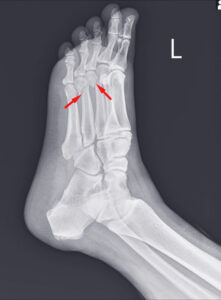Are you looking for information about the average payout for an ankle injury in the UK? Whatever type of ankle injury you have, a compensation claim might apply if you can prove the negligent actions of a third party caused your injury. You could have been injured on the roads, at work, or in a public place; we will explain how the process of claiming compensation works.
Key Take Aways
- If someone else caused your ankle injury, you could be entitled to compensation.
- Factors such as the severity of the injury and the time it takes to recover will determine the amount of compensation.
- You can claim financial losses if your injury causes them, and you can prove them.
- In general, you have 3 years to start a personal injury claim.
- The expert solicitors from our panel can help you on a No Win No Fee basis.
Our guide will cover these points as well as other useful information. You can reach out to an advisor for a free case assessment at any point, and there is no obligation to proceed. You can:
- Start your ankle injury claim by calling us on 0333 000 0729
- Make an online enquiry and request a callback.
- Reach out to us via our live discussion window below to discuss the average payout for a broken ankle.
Go To A Section Of Our Average Payouts For Ankle Injuries in the UK Guide
- Average Payouts For Ankle Injuries In The UK
- Am I Eligible To Claim For An Ankle Injury?
- Common Causes Of Ankle Injuries
- How To Make An Ankle Injury Claim
- How Our Panel Of Solicitors Can Help
- More Information
Average Payouts For Ankle Injuries In The UK
The term ‘average compensation’ can be slightly misleading as personal injury compensation amounts always vary from case to case. Whilst the average payout for an ankle injury in the UK might not be useful to you, we can tell you how damages are calculated. Those involved in calculating an amount can refer to various documents like the Judicial College Guidelines (JCG) to arrive at a value for general damages. This contains a list of injuries and suggested compensation brackets for them.
General damages are one of two categories of compensation that make up the ultimate award. They compensate the claimant for the following:
- The pain and suffering caused by the injuries.
- The psychological damage
- The negative impact on the person’s quality of life.
- Whether the person now has a permanent disability.
Below, you’ll see a table of compensation brackets taken from the JC Guidelines. It’s important to remember that these are purely example sums and that the average payout for an ankle injury in the UK will not be helpful to you. The JCG only applies to cases in England and Wales, and the top figure in our table does not come from the JCG.
Compensation Guidelines
| INJURY | HOW SEVERE? | COMPENSAION BRACKET | DEFINITIONS |
|---|---|---|---|
| Several forms of serious injury with special damages | Serious | Up to £500,000 plus | Cases where ankle injury was part of multiple harm and the person was awarded an amount under special damages for loss of income, medical expenses and adaptations at home. |
| Foot | Amputation of one foot (b) | £102,470 up to £133,810 | Level reflects the loss of the useful ankle joint. |
| Ankle | Very Severe (a) | £61,090 up to £85,070 | Unusual cases of transmalleloar fractures and soft dissue damage that leaves deformity. |
| Severe (b) | £38,210 up to £61,090 | Ankle injuries severe enough to require a prolonged time spent in a plaster cast and/or with the need for surgical pin insertion. | |
| Moderate (c) | £16,770 up to £32,450 | Ligament tears and fractures that cause less serious disabilities like difficulty on uneven surfaces, taking stairs or standing for long periods. | |
| Modest injuries (d) | Up to £16,770 | Undisplaced or minor fractures, as well as sprains, where the award amount for which is determined by duration or recovery. | |
| Achilles Tendon | Most serious (a) | Approximately £46,500 | Cases where the tendon is completed severed causing restricted ankle movement. |
| Serious (b) | £30,500 up to £36,720 | Where the tendon broke but has reattached leaving a residual weakness in the foot. | |
| General Psychological Damage | Moderately Severe (b) | £23,270 up to £66,920 | Despite initially severe mental health problems impacting the whole spectrum of daily life, a more positive future recovery is predicted. |
| Less Severe (d) | £1,880 up to £7,150 | This reflects how long the person's mental health suffered because of the accident/injury. |
Factors That Affect Your Claim
A personal injury claim can be affected by other factors:
- If you were partly to blame for your injuries (contributory negligence). However, you could still be awarded a portion of the overall compensation.
- If you had any pre-existing conditions to your ankle or elsewhere that might have a bearing on the claim.
- What financial losses you are claiming (more on this in the next section)
- Whether the other side disputes your claim and the evidence you have in support
- How the parties approach settlement negotiations.
If you’re worried that other circumstances could impact your claim, why not chat it over with us? There’s no obligation and we could connect you to a skilled solicitor from our panel to help if you are eligible.
Claiming Special Damages
The other head of loss that can make up a compensation award is called special damages. These reimburse the claimant for the financial harm caused to them by their ankle injuries. Documented evidence of these losses is always required, and special damages cannot be claimed on their own. The following evidence can be used:
- Statements and payslips that prove your income suffered because of the injuries.
- Receipts for travel expenses to vital appointments.
- Medical bills.
- Proof of payment to others who helped look after you.
- Receipts for walking aids or larger modifications needed in your home or vehicle to deal with a new disability.
The solicitors on our panel are experts at identifying what amounts can be included in your claim. Importantly, some expenses, such as private rehabilitation, can carry on for months or even years. These predicted costs must be correctly calculated and included in the claim you submit. Call to find out if you are eligible to claim.
Am I Eligible To Claim For An Ankle Injury?
Eligibility for making a personal injury claim rests upon meeting three criteria. You need to demonstrate all of the following:
- A duty of care was owed to you.
- The third party responsible breached that duty of care.
- This resulted in your ankle injuries.
These criteria define negligence and if you meet all three, you could have a valid claim for personal injury compensation. We will look at some common areas where you are owed a duty of care in the next section as well as how these duties could be breached.
If you’d like to check your eligibility in person, please call our dedicated advisory team, email or start a conversation through the dialogue box in the corner of this screen.
Common Causes Of Ankle Injuries
A duty of care can apply in various areas of daily life. We look at three of the most common places where an ankle injury might be caused when others fail to meet this duty:
Road Traffic Accidents
Road users owe each other a duty of care to conduct themselves in a way that poses no threat of injury and damage. To meet their obligations fully, they need to comply with laws in the Road Traffic Act 1988 and obligations or rules detailed in the Highway Code.
Failure to do so could make them liable to compensate anyone they injure. For example, an intoxicated driver might cause a collision in which the other road user suffers severe injuries, including a crushed ankle.
Workplace Accidents
The Health and Safety at Work Act 1974 (HASAWA) outlines the duty of care employers owe to their staff. Reasonable and practicable efforts must be made to ensure that employees are safe from harm while performing their duties.
An example of failing to meet this duty of care would be if an employer provided staff with a known faulty ladder. If the employee fell, broke their ankle and suffered soft tissue injuries in the process, a claim against the employer could apply.
Accidents In Public Places
In public places, the Occupiers’ Liability Act 1957 details how those in charge of a space must implement reasonable steps to protect the safety of those using the space lawfully.
An example of potential grounds to claim compensation here might be if an employee of a supermarket failed to attend to a wet patch on the floor that was pointed out to them, and a customer slipped, suffering a badly sprained ankle.
Accident scenarios can differ greatly, so if you suffered an ankle accident, contact us for guidance on if you are eligible to claim.
How To Make An Ankle Injury Claim
If you feel satisfied that your ankle injuries were the result of another party breaching their duty of care to you, we now look at what steps you can take to start the personal injury claims process:
Gathering Evidence – What You’ll Need
All personal injury claims require evidence that shows how the third party breached their duty of care to you and caused your injury. The list below gives an idea of what can be used:
- CCTV footage from the workplace or roadside that recorded the accident. Dashcam or doorbell footage could also be useful.
- The contact information for eyewitnesses. Appointing a solicitor means that they can approach these eyewitnesses and obtain a statement that might strengthen your claim.
- Copies of medical records, X-rays and any paperwork proving referral to a specialist.
- Proof of painkillers and other medication.
- A copy of any book kept to record accidents in the workplace.
- Photos of your ankle injuries and the obstacle or hazard that caused the injury.
Rather than feel daunted at the prospect of gathering evidence alone, why not see if a solicitor from our panel could help? They have decades of expertise gathering supporting proof of broken ankle injuries with their clients. They could do the same for you. Call to learn more.
How Long You Have To Start A Claim
The Limitation Act 1980 gives three years to start personal injury claims for compensation. This limitation period usually commences from the accident date. Under certain circumstances, this can differ, for example:
- Minors (those under 18) cannot make a claim themselves. Usually, the courts designate a parent or involved adult as a litigation friend, and they can start the claim for them. If a personal injury action is not started, the minor is allowed three years to claim starting from their 18th birthday.
- A freeze halts the limitation period for those who lack mental capacity. A litigation friend can step in and begin the case, or the person can begin a claim themselves if their mental capacity returns. They have three years to do this, starting from the date of recovery of capacity.
Our team can answer any questions or concerns you might have about personal injury claim time limits. Please reach out for more information on the average payout for ankle injuries in the UK.
How Long It Can Take To Get A Compensation Payout
Various factors might influence how long the ankle injury compensation claim actually takes:
- The duration of your recovery and the complexity of your injuries can have longer-term implications on the total compensation.
- The length of time it takes for medical reports or other evidence to be gathered.
- How promptly communication takes place between you and the other side (the defendant).
- Whether the other side accepts fault or chooses to argue your claim.
- The workload of the courts can slow the process, should proceedings be necessary. Fortunately, it is rare for cases to need the court to resolve a dispute.
A solicitor from our panel can help you navigate these issues. If you’d like to see how one might help you seek compensation for an ankle injury, reach out on the contact options above to speak to an advisor.
How Our Panel Of Solicitors Can Help
How might a No Win No Fee solicitor from our panel help you with your claim? They offer eligible claimants many excellent services, such as:
- They will help you collect evidence supporting your ankle injury compensation claim.
- They know how to use the evidence to calculate the maximum compensation owed to you correctly.
- They will argue vigorously with the other side on your behalf.
- They take care of court deadlines and any Pre-Action Protocols that apply.
- Our panel of solicitors can also keep you updated on the claim’s progress and explain any legal jargon along the way.
They do this by offering a version of the No Win No Fee contract called a Conditional Fee Agreement (CFA). Under this, you can expect:
- No upfront solicitors fees.
- No solicitors fees as the case moves forward.
- No solicitors fees for finished work if the claim fails.
- If the claim wins, there is a small amount to pay to the solicitor as a success fee.
- This percentage is restricted by law to guarantee you benefit most.
With advantages like these, finding out if they could handle your claim makes sense. Rather than wonder what the average payout for an ankle injury in the UK might be, consult with experts for an accurate idea. Contact an advisor to see if you are eligible to claim and can be connected to a solicitor from our panel:
- Start your ankle injury claim by calling us on 0333 000 0729
- Make an online enquiry and request a callback,
- Contact us via our live discussion window below to discuss the average payout for ankle injury in the UK.
More Information
You can access further reading about the personal injury claim process in these other guides:
- Here, we explore road traffic accident claims.
- More details on public liability claims after injury out and about.
- Read about a claim after a trip on a rug in a public place.
Some resources from elsewhere:
- This resource from the NHS looks at ankle pain.
- Also, here is useful information on sprains and strains to the foot.
- Finally, advice on when to call 999 after an injury.
We hope that this guide on the average payout for ankle injury UK has helped. Contact the team for any further support and information on how to claim ankle injury compensation.






